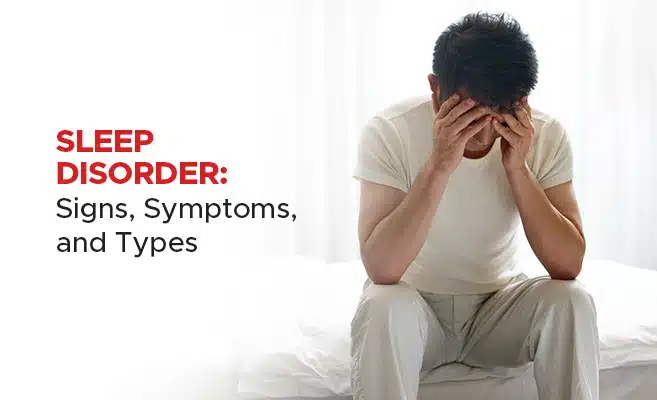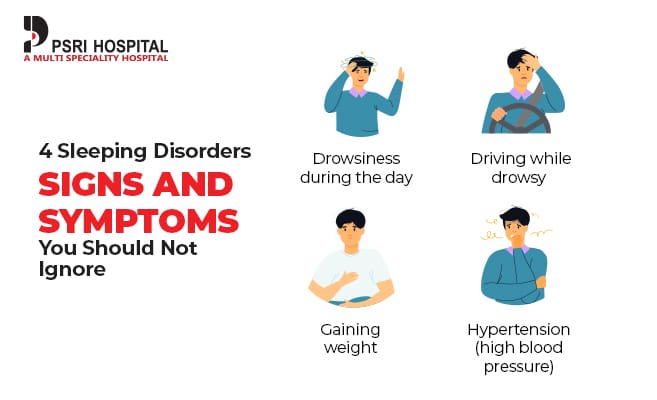Sleep Disorder: Signs, Symptoms and Types

One of our most basic human requirements is sleeping. Adequate sleep is important for several areas of our health, like sex hormones, emotions, and potentially weight control. However, not everybody can get a decent night’s sleep independently.
Many people’s sleep is adversely affected by sleep disorders, which are a range of illnesses that limit the ability to sleep adequately and regularly. These types of sleeping disorders can affect your ability to operate both during the day and at night. Sleep disorders are serious medical conditions, whether a medical condition, stress, or a sedentary lifestyle triggers them.
In this blog, let’s discuss sleep disorders signs and symptoms, causes, types, and much more to inform you about these sleep disorders.
What are the types of sleeping disorders?

Let’s discuss some common types of disorders of sleep.
1. Restless Legs Syndrome (RLS)
RLS is a syndrome in which an uncomfortable experience causes your legs to tremble or shake. It is one of the sleep disorder types that frequently occurs while sleeping at night, making it challenging to fall or remain asleep. RLS can affect anyone at any age. However, it is more frequent in adults and worsens as they age.
2. Insomnia
You have undoubtedly had nights where you couldn’t fall asleep no matter how hard or tired you worked. Insomnia could be the cause of disorders of sleep if this occurs frequently. It’s a condition that causes you to have trouble falling or remaining asleep. The best pulmonologist in Delhi NCR gives insomnia treatment depending on the patient’s condition.
3. REM Sleep Behavior Disorder (RBD)
A condition known as REM sleep behaviour disorder occurs when individuals play out their dreams, whether simple, spectacular, or violent. Patients with RBD do not perceive paralysis during the REM period of sleep. As a result, they can move their limbs, enact their dreams, and get night terrors.
4. Sleep Apnea
Sleep apnea occurs when your breath becomes disrupted while sleeping, causing you to wake up unexpectedly. If you have this illness, you may have gaps in your breathing or release gasping breaths. Those who suffer from this illness frequently cease breathing while sleeping. Sleep apnea, if left untreated, can lead to excessive blood pressure and a heart attack. It also affects the quality of your sleep.
If you are facing any of these disorders of sleep, getting in touch with the best hospital for pulmonology in Delhi can help you recognise the condition in the early stages. Visit the best hospital for pulmonology in Delhi NCR now.
4 Sleeping Disorders Signs and Symptoms You Should Not Ignore
1. Drowsiness during the day
Daytime sleepiness can be a sleeping disorder symptom that makes you irritated and intellectually exhausted.
2. Driving while drowsy
Many disorders of sleep are characterised by drowsiness while driving, particularly if you have a regular driving schedule that sets you on autopilot.
3. Gaining weight
A physiological condition can cause weight gain. Insulin resistance and diabetes are linked to sleep disturbances and can be huge deep sleep disorder symptoms.
4. Hypertension (high blood pressure)
High blood pressure can raise your chance of a heart attack or catastrophe, specifically if you don’t manage cardiac symptoms like arrhythmia.
Causes of Sleep Disorders
Several things can become major causes of sleeplessness. Regardless of the source, the end effect of all sleeping disorders is a disruption or exaggeration of the body’s normal sleeping and daytime waking cycle. There are eight causes of sleep disorders to consider such as:
- Physical conditions such as ulcers
- Medical conditions such as asthma
- Psychiatric conditions such as depression and anxiety
- Environmental factors such as consuming alcohol
- Working on the night shift
- Genetic causes such as Narcolepsy
- Consumption of some medications
What Methods are Used to Treat Sleep Disorders?
Various methods are used to treat sleeping disorders, depending on the type and severity of the disorder. Some common methods are:
- Certain sleep experts recommend cognitive behaviour therapy. This type of counselling can assist you in “recognising, confronting, and transforming stress-inducing thoughts” that leave you up at night.
- Medications and nutritional supplements for sleep talking and sleepwalking conditions.
Maintain good sleep habits by sticking to a regular sleep pattern. - Get some exercise regularly.
- Reduce the amount of noise.
- Reduce the amount of light in the room.
- Make sure you’re at a safe temperature.
The best pulmonologist in Delhi NCR will suggest treatments based on your specific condition. So get a consultation from an experienced and the best Pulmonologist in Delhi NCR for suitable treatment.
On a Final Note
Although the sleeping disorder is not fatal, they significantly impact your comfort in life, disturbing your cognition, eating, school/work efficiency, mental health, and overall medical health. Narcolepsy, insomnia, hypersomnia, restless legs syndrome, parasomnia, delayed sleep phase syndrome, and sleep apnea are all prevalent sleeping disorders that keep you from obtaining the prolonged, deep sleep you ought to perform at your best.
If you are suffering from any sleeping disorder, contact PSRI Hospital now! We have a team of the best pulmonologist in Delhi NCR who will develop the greatest treatment for solving your sleeping disorder.
FAQs
What are the types of sleeping disorders?
Several types of sleeping disorders include insomnia, sleep apnea, restless leg syndrome, narcolepsy, and parasomnias such as sleepwalking.
How can insomnia, narcolepsy, and sleep apnea be treated?
Treatment for insomnia may involve cognitive behavioural therapy, medication, or a combination of both. Narcolepsy can be treated with medication to help manage excessive daytime sleepiness and other symptoms. Treatment for sleep apnea may involve using a continuous positive airway pressure (CPAP) machine, lifestyle changes such as weight loss, and surgery in some cases.

 Book An Appointment
Book An Appointment Virtual Consultation
Virtual Consultation





